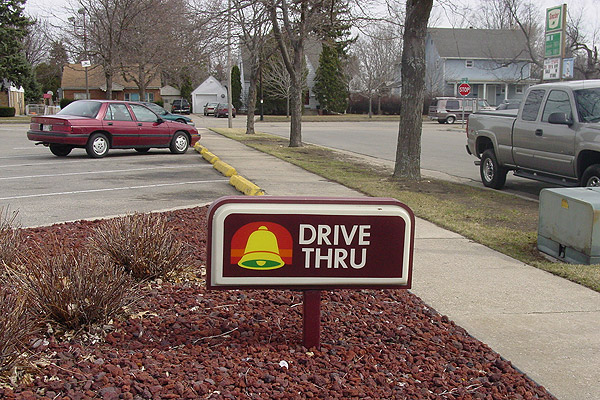
The Internet seems to have an endless appetite for generic American chain restaurants: the snarkosphere lifted a review of the Grand Forks, North Dakota, Olive Garden to a million pageviews, or at least 850,000 until it broke Google Analytics. I had that in mind—along with Tracie McMillan's history of Applebee's, Justin Peters's declaration that Sbarro is America's "least essential restaurant," and Jonathan Gold's hate screed about Olive Garden—when I came across a defense of Taco Bell by Gustavo Arellano, columnist and author of a forthcoming book on Mexican food in America (via @kevinthepang). Some of it goes a lot farther than I'm willing to, like his poke at Rick Bayless:
If it were up to the Rick Baylesses and Diana Kennedy of the world, Mexican food would still be the same dishes served to Nezahualcoyotl (which would've meant no beef, lamb, pork, rice, or tequila–but don't tell that to them!).
But I appreciated this: "Taco Bell brought Mexican restaurants to places that never had one, thereby whetting appetites for the better Mexican to come"; Arellano discusses it at some length in a Marketplace segment. Likewise:
The Bell gets all the attention for its proselytizing efforts regarding the taco, but usually forgotten was their pioneering role with burritos, which have existed on Taco Bell's menu since its 1962 beginning.
I admit it: I like Taco Bell. I don't like it because it's good, or as a substitute for the vastly superior Mexican food on offer all over Chicago. Obviously, there's no comparision. I like it for the same reason I like grape soda or lime Jarritos, with the full knowledge that they represent the real flavors of neither grape nor lime: they're failed simulacra that, as a result, have their own, take-it-or-leave it taste.
But Arellano makes a good point. America is very big and in many places historically homogenous, so some sort of transitional food was inevitable, or at least a much safer and more likely economic bet. (Plus, it adds ammunition to my theory that the generic nature of the American chain restaurant is a vital part of its social importance. Viva Shoney's!)
And if you think about it, if there's a transitional state between cheese-drowned casserole dishes and Mexican food, it probably averages out to a Taco Bell burrito.
Arellano's piece also reminded me of one of my favorite pieces ever written about Chicago food, Elizabeth Tamny's essay "Let Us Now Praise R.J. Grunt's," on the importance of the Lettuce Entertain You empire to the city's current cutting-edge culinary scene:
All that jazz might seem worlds away from the huge a la carte menus of simple, familiar dishes you'll find at a midlevel Lettuce joint, but Melman's empire includes longtime chef-driven destinations (Everest, Ambria) and even experimental menus (Tru). And the rosters at places like Alinea, Avenues, and Moto owe as much to Melman as they do to Trotter: Lettuce has provided a means of keeping culinary talent in town–with the company's general professional opportunities, certainly, but also with corporate jobs that provide income during the inevitable transition periods in chefs' careers.
[snip]
Even more important has been Melman's influence on the average Chicago restaurant-goer. The newly knowledgeable and adventurous diner is, according to Charlie Trotter, the biggest difference between being a restaurateur now and when he first began. "People were intimidated back then," he told me last year. "Now . . . they're more savvy and understand things, which is great for all of us who are trying to cook and push the envelope."
Melman's restaurants—which themselves have grown more ambitious over time—are themselves a transitional step from chain family restaurants, and part of his business genius was to bring restaurants focusing on different genres of food under one corporate umbrella: a chain of restaurants that are uniquely different but, very broadly, similar.
Lettuce dominated the restaurant news in this town from the early 1980s until the mid-to-late 90s. At worst, the company came to be seen as running a family of high-profit "theme" restaurants–a phrase Melman hates, and to be fair it doesn't seem quite accurate when you put a Melman restaurant next to, say, the Rainforest Cafe–creating restaurants for lemmings who wanted to experience their ethnic or diner food on a pristine stage set…. No matter how sophisticated a restaurant is, the "chain" designation is like the "O" on a book jacket: if you want to make a lot of money it's fine, but if you want to be taken seriously, not so much.
Grant Achatz grew up in a diner; Rick Bayless grew up in a barbecue joint. That's kind of how culture works.
In semi-related food-and-drink news: the Reader and Time Out Chicago throw down on the Chicago bar scene and how far it is behind New York; Tal Rosenberg on the racial/cognitive dissonance of the Wiener's Circle; Jason Kottke on the death of bagel mogul Murray Lender: "Regardless of your feelings on Lender's Bagels, we probably wouldn't even be having the bagel argument without Murray Lender."
Photograph: compujeramey (CC by 2.0)


